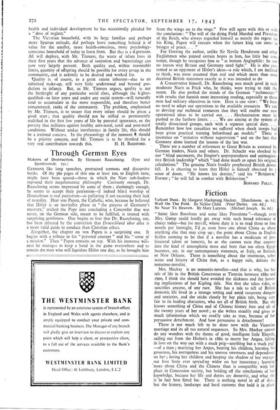Through German Eyes
Makers of Destruction. By Hermann Rauschning. (Eyre and Spottiswoode. r5s.)
GERMANS like long speeches, protracted sermons and discursive books. Of the 36o pages of this one at least too, to English taste, might have been spared—those in which the Nazi sub-leaders expound their megalomaniac philosophy Curiously enough, Dr. Rauschning seems impressed by some of them ; alarmingly enough, he seems to accept their patriotism—if indeed blin I worship of Deutschtum is real patriotism—as palliating if not excusing their lack of morality. Herr von Papen, the Catholic, who, because he believed that Hitler is an inevitable phase in " the process of Germany's recovery," tricked the Pope into concluding a Concordat that was never, on the German side, meant to be fulfilled, is treated with surprising gentleness. • One begins to fear that Dr. Rauschning, too, has been infected by the conviction that Deutschland fiber alles is a more valid guide to conduct than Christian ethics.
Altogether, the chapter on von Papen is a surprising one. It begins with a tribute to his " personal courage " and his " sense of a mission." Then " Papen remains on top. With his immense wili- ness he manages to keep a hand in the game everywhere and to remain the man who will liquidate Hitler one day, as he brought him
from the wings on to the stage." Few will agree with this or with the conclusion : " The will of the dying Field Marshal and President of the Reich, who always regarded himself as merely the regent for his King, Papen will execute when the future king can come as bringer of peace. . . ."
For Goering the author, unlike Sir Nevile Henderson and other Englishmen who pinned certain hopes in him, has little but con- tempt, though he recognises him as " at bottom Anglophile: he saw no reason why Britain and Germany need fight." He is also pre- sented as an-opponent of Hitler's ideas—a role which, I am inclined to think, was more assumed than real and which more than once deceived British statesmen exactly as it was intended to do A Conservative himself, Dr. Rauschning sees much good in such moderate Nazis as Frick who, he thinks, were trying to ride the storm. He also probed the minds of the German " technocrats " with results that furnish most interesting reading, especially as these men had military objectives in view. Here is one view : " We have no need to adapt our operations to the available resources. We can so develop our technical resources that they will enable our new operational ideas to be carried out. . . . Mechanisation must be pushed to the farthest limits. . . . We are aiming at the system of totally dissociated groups, each with a separate special duty. . . . Remember how few casualties we suffered when shock troops had been given practical training beforehand an models." There is insistence on " initiative without supervision " and on the fact that Germany alone learned the lessons of the last war.
There are a number of references to Great Britain as assessed by German leaders, Nazis and others. Dr. Schacht was shocked by our " blind unconcern, the Empire's unpreparedness and unimagina- tive British leadership " which " had done much to upset his original calculations." The genuine Nazis frankly prophesied British down- fall. It is cheering to learn that Hitler is himself obsessed by a sense of doom. " He knows his destiny," said his " Benjamin," Forster ; "he will fall in combat with Bolshevism."
BERNARD FOLE Y.


























 Previous page
Previous page